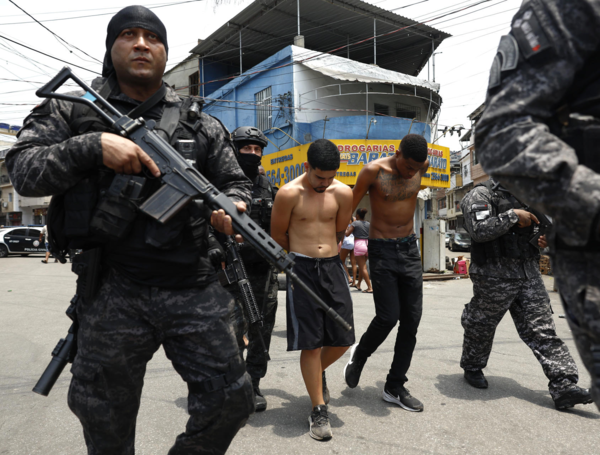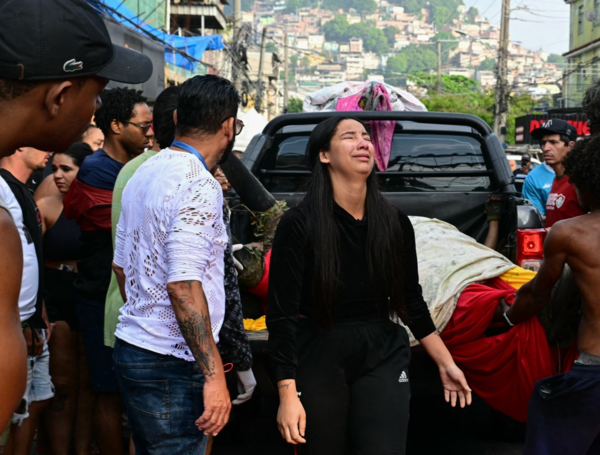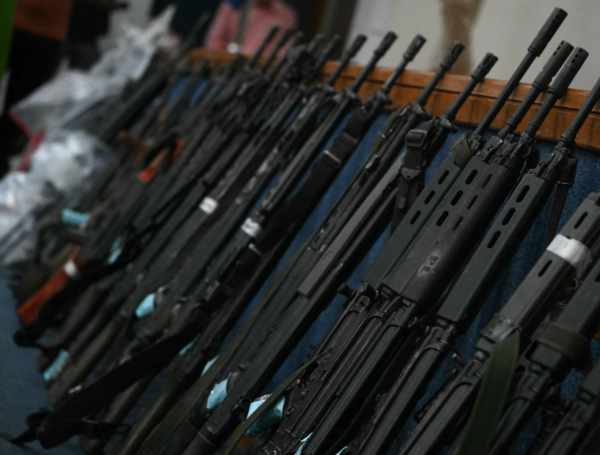Residents of Rio de Janeiro recovered dozens of dead bodies on Wednesday following the massive police operation launched the previous day against Comando Vermelho, one of Brazil's largest drug trafficking gangs.

After reporting 64 deaths on Tuesday, Rio authorities announced a final updated figure of 119 deaths on Wednesday. However, according to figures from the Public Defender's Office, an institution that compiled the data from forensic institutes and at the scene, the death toll is 132. Among those who lost their lives are four police officers, and the rest, according to official information, are suspected members of the armed gang who resisted arrest.
It is worth noting that, until now, the deadliest crime in Brazilian history was the Carandiru massacre, which occurred on October 2, 1992. On that day, 111 detainees were killed in an intervention by the military police who were trying to control a riot in that prison in the state of São Paulo.
On Tuesday, Rio de Janeiro experienced scenes of war with shootings, fires, and clashes between law enforcement and suspected criminals. According to authorities, the criminals used buses as barricades and drones to launch explosive devices.
The operation took place in the Penha and Alemão favela complexes, an impoverished area with 200,000 inhabitants, and the clashes spread to a wooded area in the hills bordering these neighborhoods. These woods were littered with bullet-riddled bodies on Wednesday morning.
The residents of the favela mobilized to search for their relatives and, without help from the authorities, ventured into the forest at dawn to recover the bodies using makeshift stretchers. The bodies were laid out in a row of at least 50 people, side by side, in early morning in São Lucas Square in Penha, in full view of relatives, onlookers, and a few journalists.
Rayune Diaz Ferreira, one of the community's residents, is searching for her cousin and outraged by an unprecedented police operation. “The state abandoned us a long time ago and has abandoned us again. In this massacre, we, the residents, are the ones carrying the bodies. They left the bodies there in the forest, and the residents spent the entire night, without sleep or food, searching for and carrying corpses endlessly,” she recounted.
For his part, neighbor and activist Raull Santiago, 36, asserted that “the State came to massacre.” “It wasn’t an operation. They came directly to kill, to take lives; there are many dead,” he said while placing his hand on the face of a deceased young man.
“There are people who have been executed, many of them with a shot to the back of the head, a shot in the back; this cannot be considered public safety,” said lawyer Albino Pereira Neto, who represents three families who lost a relative and who denounced that the victims “were subdued and murdered in cold blood.”
But while voices such as that of the United Nations (UN) criticized the police action, the governor of the state of Rio de Janeiro, Cláudio Castro, an ally of former far-right president Jair Bolsonaro and the political figure responsible for the operation, called it a “success” and denied that the police could have killed innocent people. This view was supported by the entire Rio police leadership, who offered details of the operation, which had been planned for a year and, they said, aimed to imprison 180 suspected drug traffickers.

The secretary of the Rio Civil Police, Felipe Curi, asserted that the operation was planned to corner the drug traffickers and force them to take refuge in the wooded area, in order to reduce the risk of civilian casualties. Curi affirmed that the action was “legitimate” and lashed out at the organizations and politicians who have questioned it, labeling them “narco-activists.”
Almost simultaneously, Brazil's Justice Minister, Ricardo Lewandowski, questioned the legality of the operation before boarding a flight to Rio de Janeiro, where he plans to address the situation with local authorities.
Lewandowski noted that President Luiz Inácio Lula da Silva was “horrified” by the number of deaths and “surprised” that he had not received prior notice of this action from regional authorities.
“The operation was extremely brutal, especially violent. We will see if it is compatible with the democratic rule of law,” the Justice Minister added.
A war of numbers
The official death toll (119) clashes with the Public Defender's Office's count of 132, and with the tally made by journalists at the scene, who also reported a higher number of deaths. Separately, 113 suspects were arrested and 10 teenagers were taken into police custody; 119 weapons, 14 explosive devices, and tons of drugs were also seized.
Curi said this was “the biggest blow” dealt to Comando Vermelho since the organization's inception in the 1970s. He also emphasized that it occurred at the gang's “nerve center,” a location with tentacles throughout Brazil and in some neighboring countries.
The massive operation caused chaos. Schools suspended classes, public transportation collapsed, and thousands of residents were trapped, unable to return home.
Meanwhile, Governor Castro ordered increased patrols throughout the state on Wednesday, while Argentina activated a maximum alert on its borders with Brazil.

“I am going to implement a maximum alert at the borders to prevent any crossings or passage of those who are clearly trying to move away from the epicenter of the conflict in Rio,” stated National Security Minister Patricia Bullrich. She added that “this maximum alert means scrutinizing all Brazilians who come in, checking their criminal records,” and clarified that this measure will not affect tourists wishing to enter the country.

